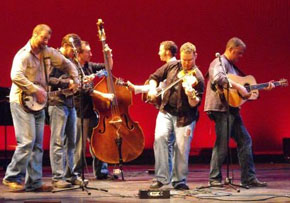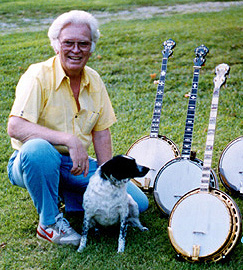May 7, 2012
Steve Kaufman Tapped To Head Federal Guitar Program For Unemployed Men
Prolific guitarist, educator to bridge gap between acoustic music, US federal bureaucracy

Sociological research indicates that unemployed and underemployed men who play guitar are significantly more satisfied with a life of poverty than their guitar-less counterparts.
WASHINGTON, DC — In the face of a never-ending employment crisis, a weak economic recovery and intractable Republican opposition to almost all legislation of any kind, the Obama Administration is developing bold new initiatives aimed at improving quality of life for the nations jobless masses.
One current proposal that specifically targets young adults coincides with the revelation that one in two recent US college graduates are either unemployed or underemployed.
According to White House sources, the president will soon unveil the United States Acoustic Guitar Initiative (USAGI), a program offering tax credits for acoustic guitars and federally sponsored guitar training for unemployed young men.
“Putting people back to work is still our ultimate goal, but even in the best-case scenario we’re looking at many more years of record unemployment,” said a source within the Department of Labor (DOL).
Indeed, experts are describing the program as a creative and politically realistic stopgap measure aimed at easing the nation’s unemployment problem without actually creating jobs.
“To a good guitarist, food, shelter, clothing, and personal health are not just secondary, they are almost irrelevant,” said Jordan Tice, an expert.
“These young men happily survive on nothing but their own dreams of grandeur,” he added.
Read more
2009 Highlight: Pikelny Upstages Fleck With Highly Innovative Facial Hair
Moustache solo in C major dazzles Telluride

Despite countless technical achievements, the problem of how to make progressive banjo playing less earnest and more ironic had thwarted banjoists for years.
TELLURIDE, CO — As progressive banjo players continued their race towards the most innovative style, one picker’s achievement stood alone this year as the most significant artistic and musical advance in all of banjo playing.
Scholars agree that Noam Pikelny’s performance at the 2009 Telluride Bluegrass Festival marked a milestone in modern banjo and established a new paradigm for artistic innovation in acoustic music.
During Punch Brothers’ highly anticipated “Play and Sing Bluegrass” set, Pikelny played flawlessly in a variety of styles but did so with long sideburns and a highly ironic moustache styled after many well-known players’ of the 1970’s.
Critics and fans immediately agreed that Pikelny’s facial hair constituted a breakthrough tour-de-force in musical sarcasm.
For the past ten years, banjo players have struggled with how to achieve 21st century “superirony” through progressive banjo playing.
Despite countless advances affecting fingerings, tunings, tone, amplification, and harmony, the problem of how to make progressive banjo playing less earnest and more sardonic has repeatedly thwarted banjoists.
“I don’t get it. You’d think these guys were working on Sputnik or something,” said M. Murray, a rock music fan.
Indeed, banjo players have historically sought technical solutions to musical problems, an approach which worked well for most of the last century.
Luminaries such as Earl Scruggs, Don Reno, Bill Keith, and Bela Fleck all founded influential music careers on their development of pioneering new techniques.
“Those days are over. Novelty is no longer quite such an important force behind major musical achievements,” said Dr. Sherwood Harman, a pop musicologist.
“As Lady Gaga, Justin Timberlake, Usher, the Arctic Monkeys, Britney Spears, OutKast, the White Stripes, and countless indie bands have demonstrated: the greatest artistic innovation of the ‘00’s has been to unapologetically borrow and recombine preexisting styles, but mix in a shit-ton of irony,” he continued.
“Do you mean like Kanye West’s space odyssey?” asked one student.
“No, actually, that was serious,” responded Dr. Harman.
On the final night of Telluride, Fleck joined Pikelny and the rest of Punch Brothers on stage at the Sheridan Opera House, and the expanded group reprised Fleck’s modern bluegrass classic “See Rock City”.

Even skeptics of progressive bluegrass acknowledged Pikelny's unique and highly effective approach.
“But instead of taking a banjo break when his turn came around, Noam just let the audience consider his moustache for like a minute-and-a-half,” recalled E. Helmers, a banjo player in the audience.
Although Fleck played a creative and engaging solo over his own composition, his playing lacked the utter freshness and originality of Pikelny’s moustache solo.
Even skeptics of progressive bluegrass acknowledged Pikelny’s totally unique and highly effective approach.
“Punch Brothers are my new favorite band,” said C. DiMario, who is uncommonly skeptical of most things.
Over the course of the concert, Pikelny brought his moustache to bear on everything from note-for-note Radiohead covers to ultra-traditional bluegrass banjo breaks.
“Noam has just brought progressive banjo playing into the new decade,” said Helmers.
News of Guantanamo Music Torture Inspires Mountain Heart to Play Harder, Faster Than Ever Before
MARIETTA, GA — The United States’ practice of torturing detainees and prisoners of war with prolonged exposure to unbearably loud music at Guantanamo Bay and other ‘black sites’ has provoked strong reactions of outrage and concern within the music industry.
But within the world of bluegrass several professionals are expressing support for the use of music in the War on Terror, arguing that very loud music is both legal and highly effective as a tool of interrogation.
Sources close to the band Mountain Heart indicate that the renowned group is urgently striving to play faster, harder, and louder than ever before in hopes that its music help win the war on terror.
“The revelation of music torture or, ‘torture lite’, was a real call-to-arms for these guys,” said a friend of the band.
Music experts agree that Mountain Heart is the only bluegrass band with the skills, intensity, and patriotic fervor to make music significantly more effective than what the US government already uses on prisoners.
“They could make Deicide’s ‘F**k Your God’ seem like a pretty little lullaby,” said bluegrass documentarian M. Miado.
“Back in simpler times, State would send American musicians to perform overseas to promote peace, cultural harmony, and a positive perception of the US, ” said an anonymous State Department official.

The music of Mountain Heart has always been characterized by an unyielding display of power, American passion, and complete dominance over the listener and other bluegrass ensembles.
“The tragic events of 9/11 exposed that strategy as so much hippie bullshit, so we’ve adopted a new, wartime application for music in the field,” he added.
One Guantanamo interrogator estimated that excruciatingly loud, repetitive music interspersed with blinding flashes of strobe light could ‘break’ a detainee in just four days.
“Four days is too long when lives hang in the balance,” said one Mountain Heart member. “If we need actionable intelligence we need it NOW.”
The music of Mountain Heart, which to this point has been geared toward audience enjoyment, has nonetheless been characterized by an unyielding display of power, American passion, and complete dominance over the listener and other bluegrass ensembles.
Indeed, medical experts caution that enjoying the music of Mountain Heart for more than two consecutive hours causes a sensory over-stimulation that may result in permanent desensitization to normal human experiences.
“It’s the closest thing the bluegrass fan has to smoking crack,” said J. Harper, an enthusiast.
Meanwhile, numerous pop stars including members of Rage Against the Machine, Pearl Jam, and REM have recently invoked the Freedom of Information Act to force the CIA and FBI to release the names of songs used in their prisoner interrogations.
Among other things, these stars allege that the CIA is using music to “humiliate, terrify, punish, disorient and deprive detainees of sleep, in violation of international law.”
“Dude, Mountain Heart is gonna be all over this,” added Harper.
Curtis McPeake Verifies $85K Pre-War Banjo Using Taste, Smell
“This is the real McCoy,” says expert appraiser

Impressively, McPeake’s smell and taste test was able to pinpoint the banjo’s origin to a specific 1933 lot and serial number.
MT. JULIET, TN— Vintage banjo expert Curtis McPeake has awed the banjo world and fortified his own legend by successfully validating the origin of a pre-World War II Gibson Mastertone flathead based on smell and taste alone.
“I found this banjo in my grandpa’s attic after he passed on, and everyone told me that Curtis McPeake would be the world’s best guy to appraise it,” said the banjo’s owner, a Michigan native.
“Absolutely nobody else in the world has this level of familiarity with pre-war banjos. His appraisals are definitive, but I must admit there’s a certain element of mystery there,” said R. Smith, a Tennessee instrument maker.
Read more
Rayna Gellert Executes Twelve-Step Program Backwards in Bid To Recover From Long –Term Sobriety

In an effort to increase her old-time credibility, Rayna Gellert will start at step twelve and work backwards until she has an uncontrollable drinking problem, which she will then deny.
LEXINGTON, KY — Fiddler, singer, and longtime teetotaler Rayna Gellert has about-faced, and she is taking an innovative and methodical approach to becoming a raging alcoholic and old-fashioned moonshine addict.
“My final goal is an uncontrollable problem, immense harm to my loved ones and coworkers, and a total repudiation of God, as I understand Him,” said Gellert.
“And of course, moonshine,” she added.
Gellert, who now enjoys spiritual enlightenment as well as a stable and productive life, announced her plan in response to criticism that her life has diverged too far from the dark folkloric subjects she addresses in her music.
According to critics, the evenness of her personality has become so striking that it now threatens her artistic credibility and limits her potential for mainstream success.
“It’s a long hard road to excessive drinking and misbehavior from where Rayna is starting out,” said Gellert’s sponsor, a musician and fellow Indiana native who goes by the name Uncle Daddy.
“You can do it, baby,” he added.
“The twelve steps provide well-established, clearly defined, attainable goals and logically they do work in reverse,” he continued.
The traditional twelve-step method promotes recovery from various forms of addiction, and the steps are typically executed in order from step one to step twelve.
Gellert, who has simply reversed the process, will begin at step twelve and work backwards.
First, she will experience the exact opposite of a spiritual awakening, suddenly stopping to spread goodwill and assistance to those who need it.Then, she will forever cease all prayer and meditation that might improve her conscious contact with God.
Having totally lost all knowledge of His will and the power to carry that out, Gellert will then make a personal inventory of her future moral shortcomings.
“And that’s only the third step,” said Gellert.
She will then start to make direct damage to other people whenever possible, except when to do so would help them or others in any way.
In the next step, she will make a list of all persons she intends to callously harm, and after getting drunk and inflicting that harm, she will destroy the list.
She will proceed by arrogantly demanding that God Almighty bestow numerous additional shortcomings upon her, regardless of whether she is ready to embrace all these defects of character.
She will then deny to God, herself, and other human beings the exact nature of her wrongs.
In the tenth step, Gellert will make the conscious decision to reclaim her will and life from the care of God, as she understands Him.
She will then come to believe that no power greater than herself can restore her to insanity, and believing this, Gellert will set up a moonshine still and continue drinking heavily.
Finally, she will deny that she is powerless against alcohol and that her life has become unmanageable, and she will enter a brief but exciting period of self-destruction and reduced productivity.
“I know Rayna, and this is not going to be easy for her. But with small enough steps and all of our support, hopefully she can do it,” said J.P. Jones, a mandolin player and supportive fan.
Botched Exorcism Leaves Soul of Bruce Molsky in 13-Year-Old Girl
“Um, I’m not dead yet, people,” says Molsky
CORVALLIS, OR — A daring attempt to expel the immortal soul of old-time fiddler Bruce Molsky from a young girl’s earthly body has ended in disaster, leaving the girl, Tatiana Hargreaves, 13, possessed by Molsky forevermore.
According to her family, Miss Hargreaves first began to show the extraordinary signs of diabolical possession several years ago, when with no practice whatsoever she acquired an almost superhuman ability to play the old-time fiddle, the long-established instrument of the devil.
Around the same time, she spontaneously and inexplicably became fluent in an entire repertoire of rare, often apocalyptic songs from Appalachia, which she sang in an antique dialect.
Read more
Jim Mills Disappears in African Jungle Hunting Legendary Prewar Banjo

Jim Mills, seen here preparing for his last great banjo hunt, has recently disappeared deep in the Congolese wilderness.
AFRICA — Jimmy Mills, renowned prewar instrument expert and banjo star of Ricky Skaggs and Kentucky Thunder, has lost all contact with the outside world and vanished somewhere deep in the former Belgian Congo.
Read more
Mount Shasta Fiddle Camp Selected as New Site of CBS’s “Survivor”
One camper to be voted home every day
NEW YORK — In a move expected to transform the genre of reality TV and revolutionize the fiddle camp paradigm, CBS has announced a partnership with the Clarridges’ Mount Shasta Fiddle Camp, and the next season of the popular Survivor reality show will take place at the Northern California campsite.
Read more






